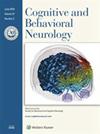神经梅毒模拟59岁男性额颞叶痴呆的行为变异
IF 1.3
4区 医学
Q4 BEHAVIORAL SCIENCES
引用次数: 2
摘要
我们提出的情况下,一名男子表现出临床表型的行为变异额颞叶痴呆(bvFTD)。这名男子在几个月的时间里出现了言语攻击等精神障碍,随后出现了认知和额叶行为障碍,符合bvFTD的临床标准。额颞区萎缩和代谢低下与诊断一致。然而,梅毒感染的血清筛查检查呈阳性,尽管性病研究实验室测试呈阴性,但脑脊液分析提示诊断为神经梅毒。经特异性抗生素治疗后,患者的行为异常和认知缺陷明显改善,证实神经梅毒是临床表型的原因。治疗后1年认知缺陷完全恢复,并保持稳定2年。从第一次治疗开始约2年半后,该男子的行为障碍轻度恶化,此时我们对他进行了重新评估。他的认知能力稳定,性病研究实验室检测阳性,确诊为神经梅毒。在这种情况下,我们证明在某些情况下,神经梅毒可以模仿额颞叶痴呆。作为可治疗的痴呆的原因,在bvFTD的鉴别诊断中应考虑到这一点,特别是当注意到精神症状和认知能力迅速下降时,即使存在脑萎缩和/或代谢低下。本文章由计算机程序翻译,如有差异,请以英文原文为准。
Neurosyphilis Mimicking Behavioral Variant of Frontotemporal Dementia in a 59-Year-Old Man
We present the case of a man exhibiting a clinical phenotype of behavioral variant of frontotemporal dementia (bvFTD). The man had developed psychiatric disturbances with verbal aggressiveness over a few months, followed by cognitive and frontal behavioral disorders, fulfilling the clinical criteria for bvFTD. Atrophy and hypometabolism in frontotemporal regions were consistent with the diagnosis. However, serum-screening exams for syphilis infection were positive, and CSF analysis, despite a negative Venereal Disease Research Laboratory Test, suggested the diagnosis of neurosyphilis. After specific antibiotic therapy, the man’s behavioral abnormalities and cognitive deficits notably improved, confirming neurosyphilis as the cause of the clinical phenotype. The cognitive deficits completely recovered 1 year post therapy and remained stable for 2 years. After ∼2½ years from the first treatment, the man’s behavioral disorders mildly worsened, at which time we re-evaluated him. His cognition was stable, and a positive Venereal Disease Research Laboratory Test confirmed the diagnosis of neurosyphilis. With this case, we demonstrated that in some instances, neurosyphilis can mimic frontotemporal dementia. As a cause of treatable dementia, it should be considered in the differential diagnosis of bvFTD, particularly when psychiatric symptoms and a rapid cognitive decline are noted, even in the presence of brain atrophy and/or hypometabolism.
求助全文
通过发布文献求助,成功后即可免费获取论文全文。
去求助
来源期刊
CiteScore
2.40
自引率
7.10%
发文量
68
审稿时长
>12 weeks
期刊介绍:
Cognitive and Behavioral Neurology (CBN) is a forum for advances in the neurologic understanding and possible treatment of human disorders that affect thinking, learning, memory, communication, and behavior. As an incubator for innovations in these fields, CBN helps transform theory into practice. The journal serves clinical research, patient care, education, and professional advancement.
The journal welcomes contributions from neurology, cognitive neuroscience, neuropsychology, neuropsychiatry, and other relevant fields. The editors particularly encourage review articles (including reviews of clinical practice), experimental and observational case reports, instructional articles for interested students and professionals in other fields, and innovative articles that do not fit neatly into any category. Also welcome are therapeutic trials and other experimental and observational studies, brief reports, first-person accounts of neurologic experiences, position papers, hypotheses, opinion papers, commentaries, historical perspectives, and book reviews.

 求助内容:
求助内容: 应助结果提醒方式:
应助结果提醒方式:


